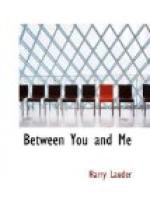Lang agane I’d an engagement at the Paragon Music Hall—it must be many and many a year agane. One evening I was going through the City in my motor car—the old City, that echoes to the tread of the business man by day, and at nicht is sae lane and quiet, wi’ all the folk awa’. The country is quiet at nicht, tae, but it’s quiet in a different way. For there the hum o’ insects fills the air, and there’s the music o’ a brook, and the wind rustling in the tops o’ the trees, wi’ maybe a hare starting in the heather. It’s the quiet o’ life that’s i’ the glen at nicht, but i’ the auld, auld City the quiet is the quiet o’ death.
Weel, that nicht I was passing through Threadneedle street, hard by the Bank of England, that great, grey building o’ stane. And suddenly, on the pavement, I saw them—twa young things, glad o’ the stillness, his arm aboot her waist, their een turned upon one another, thinking o’ nothing else and no one else i’ a’ the world.
I was sae sorry for them, puir weans! They had’na e’er ta’en a bit walk by their twa selves in the purple gloaming. They knew nothing o’ the magic of a shady lane, wi’ the branches o’ old trees meeting over their heads. When they wad be togither they had to flee tae some such dead spot as this, or flaunt their love for one another in a busy street, where all who would micht laugh at them, as folk ha’ a way o’ doing, thoughtlessly, when they see the miracle o’ young love, that is sae old that it is always young.
And yet, I saw the lassie’s een. I saw the way he looked at her. It was for but a moment, as I passed. But I wasna sorry for them mair. For the miracle was upon them. And in their een, dinna doot it, the old, grey fronts o’ the hooses were green trees. The pavement beneath their feet was the saft dirt o’ a country road, or the bonny grass.
City folk do long, I’m sure o’ it, for the glen and the beauty o’ the countryside. Why else do they look as they do, and act as they do, when I sing to them o’ the same? And I’ve the memory of what many a one has said to me, wi’ tears in his een.
“Oh, Harry—ye brocht the auld hame to ma mind when ye sang o’ roaming in the gloaming! And—the wee hoose amang the heather!”
’Tis the hamely songs I gie ’em o’ the country they aye love best, I find. But why will they be content wi’ what I bring them o’ the glen and the dell? Why will they no go back or oot, if they’re city born, and see for themselves? It’s business holds some; others ha’ other reasons. But, dear, dear, ‘tis no but a hint o’ the glamour and the freshness and the beauty o’ the country that ma songs can carry to them. No but a hint! Ye canna bottle the light o’ the moon on Afton Water; ye canna bring the air o’ a Hieland moor to London in a box.
Will ye no seek to be oot sae much o’ the year as ye can? It may be true that your affairs maun keep you living in the city. But whiles ye can get oot in the free air. Ye can lee doon upon yer back on the turf and look up at the blue sky and the bricht sun, and hear the skylark singing high above ye, or the call o’ the auld hoot owl at nicht.




